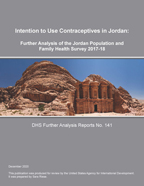- PUBLICATIONS
- JOURNAL ARTICLES
- ACCESS PUBLICATIONS
Publications Summary
- Document Type
- Further Analysis
- Publication Topic(s)
- Family Planning
- Country(s)
- Jordan
- Survey
- Jordan DHS, 2017-18
- Language
- English
- Recommended Citation
- Riese, Sara. 2020. Intention to Use Contraceptives in Jordan: Further Analysis of the Jordan Population and Family Health Survey 2017-18. DHS Further Analysis Reports No. 141. Rockville, Maryland, USA: ICF.
- Download Citation
- RIS format / Text format / Endnote format
- Publication Date
- December 2020
- Publication ID
- FA141
Download this publication
There is no printed copy available to order.
